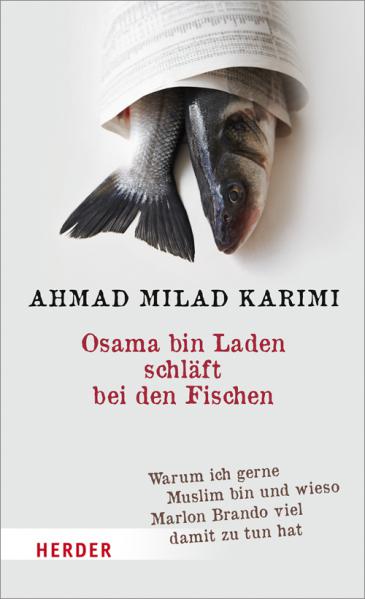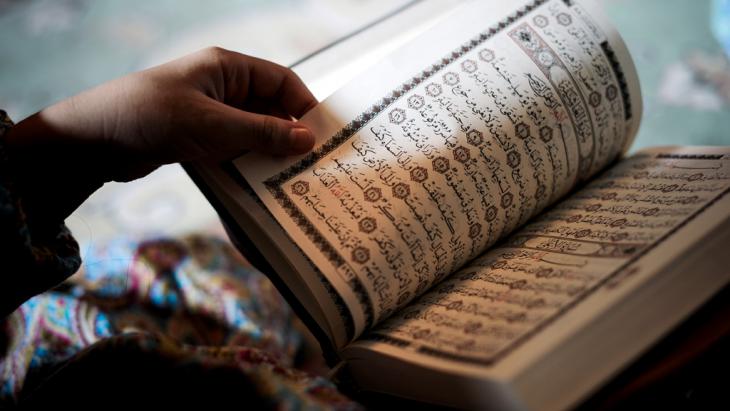Accessing the Koran

Professor Karimi, let me begin our conversation with a quote from Goethe. ″If Islam means submission to God′s will, then we all live and die in Islam... ″ he wrote in his West-Eastern Divan. Do you agree with him?
Ahmad Milad Karimi: Completely. What Goethe wrote is what I live. This surrender to God frees me as a person.
It was Johann Gottfried Herder who suggested that Goethe study the Koran. Was the Western intellectual world more open to Islam then than it is today?
Karimi: It is a curious thing. Our age, which is shaped by information, when we have access to all texts through libraries and the internet, gives us the impression that we know less and less. When you call to mind the openness with which Goethe, who was deeply rooted in his tradition – to say nothing of Herder – turned towards the other, the foreign, I find that lacking today.
Of course, Goethe′s attention was not uncritical. At first, he felt almost repelled by the voice of the Koran and hardly knew where to begin with it. But he didn′t give up. He started researching and developing his own mind as well – he even started learning Arabic. With a trembling hand, he wrote out Koran verses in Arabic script. This in itself is very moving, regardless of the fact that it refers to Islam.
For Goethe, the Koran was a ″literary masterpiece″ and this was also Friedrich Ruckert′s attitude in preparing his translation. How do you explain the fact that since then, no German poet has been inspired to produce a translation of the Koran?

Karimi: Ruckert was a phenomenon. These days you rarely encounter German-language poets who can speak Arabic so well. To be able to make a translation of the Koran, you have to be skilled in many different areas. And Ruckert was. He was also familiar with other languages. Rainer Maria Rilke might have been able to follow in his footsteps, had he had a command of the Arabic language.
When your translation of the Koran was published, there were already a few German translations, although they were more academic in character, their language quite stilted. Was that why you undertook a new translation?
Karimi: I didn′t want to lose any philological precision in my translation, either. That said, a translation purely motivated by the idea of transferring the content of a message from one language to another is also misguided. You have to inhabit the voice of the other language. The Koran represents a curious literary exception, comparable to Homer′s Odyssey. You can only produce a successful translation of these texts when you take into account that you are dealing with rhymed prose, which has a sound and a rhythm to it. I translated ″by ear″, listening to Arabic Koran recitations until I had really taken possession of the text, so that I could reproduce its sound in German.
In your book, ″Hingabe″ (Devotion), you quote not just Islamic scholars, but philosophers from the Western tradition in particular. Are the questions thrown up by the Koran the same questions that trouble Western philosophy?
Karimi: The questions are the same whatever world view we follow. The Koran is about humankind and a human being is always a question. I don′t allow myself to be blinded by names, nationalities or religious affiliations. For me, it′s all about the subject matter. In this, I follow the example of the Islamic tradition of the Middle Ages. Al-Kindi und Ibn-Rushd didn′t read Aristotle because he was a good Muslim – they read him because they relished his incredibly challenging insights. Al-Maturidi, Islam′s great influential theologian, posed the same question as Leibniz would subsequently – of why there is creation and not nothing.
Islam is frequently charged with belonging to the Orient and therefore being foreign. And yes, the Koran was produced in the Orient, but so were the holy books of Judaism and Christianity. What makes it so difficult to bring Islam into the classic monotheistic tradition?
Karimi: A lack of education. When I speak to Jewish or Christian colleagues who are familiar with their own traditions and with Islam, there is no sense of foreignness there. Nobody calls into question the fruitful textual relationship between the Koran and the other holy books. It′s clear that they all form a tradition together, whether you call it the classical monotheistic tradition or the Abrahamic faiths.
We still have a great deal of work ahead of us to get these messages across. Because it′s the task of Muslims in Europe – and I say that entirely self-critically – to break through the foreignness of the Koran and the Islamic tradition and to show that we are just as concerned as the other traditions with freedom, human dignity and the preservation of God′s creation. The Koran doesn′t provide any alternatives to brotherliness.
Is it painful for you when terrorists invoke the Koran and commit crimes in the name of Islam?
Karimi: It′s incredibly painful to see my religion, my God, my Prophet and my religious tradition defamed in this way. But it′s even more painful that the terrorists′ self-predication is being taken up so quickly. Religious texts are fragile. They can′t defend themselves. Anyone can invoke them. A lot of blood has been shed in the name of Christianity as well. But that doesn′t mean Christianity should feel responsible for it.
The Koran isn′t a subject. Subjects are people who put forward their understanding of this religion. And if terrorists say their terrorism is founded in Islam, we must not believe them. But I don′t want to spend my life justifying things and always having to point out what isn′t true. I would rather devote myself to the task of spreading an authentic understanding of Islam.
But the terrorists aren′t the only ones interpreting the Koran as they see fit; it′s also the protagonists of Islamophobic movements in the West. They practise their own exegesis and use it to claim that Islam is foreign and dangerous...

Karimi: Unfortunately, nobody is bringing the competence of these protagonists into question either. The Koran isn′t a toolbox; you can′t just pick out the particular tool out of it to work with. You shouldn′t trust anyone who simply quotes the Koran, whether he′s a Muslim or not. It requires careful examination, a particular hermeneutics, a theological positioning, an understanding of the whole composition and the individual verses′ contextual relation to it.
I welcome religious criticism. It challenges us. We can grow from it. This religious musicality is important if we are to live together successfully. I′m also very willing to debate whether my understanding of Islam is successful. But sometimes I get the impression that it isn′t my understanding of Islam that is being criticised; I′m being accused of giving up my religion. In my freedom, I don′t like to be told that.
There is a need for a greater number of educated representatives of Islamic culture in our midst, who can speak out in universities and in public on an equal footing with their Western colleagues. You are one such representative. But you′re still relatively alone in this.
Karimi: I′m happy to say that′s not true. As we have begun to establish Islamic theology in German universities, several sites have been established where colleagues are doing just that. In Munster, I have somewhere between 600 and 800 students. These are young people engaging with their religion in a theological sense. They are examining proofs of God′s existence and critiques of these from an Islamic viewpoint; they are studying Kant, but also al-Ashari and the Koran. This generation comes from the religious community itself. They will shape the future. That gives me a sense of optimism.
What are the challenges facing Islamic theology today?
Karimi: The greatest challenge is that Islam is not currently communicated well enough. I am always angered when people talk about Islam the way they do in the PEGIDA movement. But we haven′t yet managed to communicate our religion so that certain claims about it are seen as absurd from the outset. We gain nothing by continuing to distance ourselves. We can only gain if we succeed in formulating debates ourselves, launching discourse and practising responsibility. As Muslims, we have to make it our duty to shape these things, as part of this society.
Interview by Ruth Renee Reif
© Qantara.de 2016
Translated from the German by Ruth Martin
Ahmad Milad Karimi was born in Kabul in 1979. He and his family fled the civil war in Afghanistan when he was 13. Karimi studied philosophy and Islamic studies from 2000 to 2006 at the Albert Ludwig University in Freiburg and at Delhi University in India. He obtained his PhD in 2011, with a thesis on Hegel and Heidegger.
